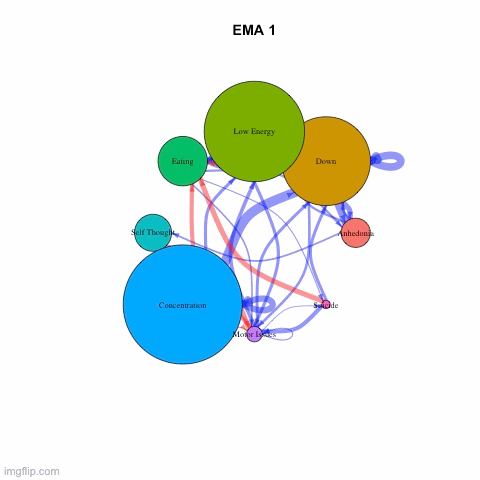
Depressive Symptoms as a Heterogeneous and Constantly Evolving Dynamical System: Idiographic Depressive Symptom Networks of Rapid Symptom Changes among Persons with Major Depressive Disorder
Abstract
Major depressive disorder (MDD) is the leading cause of global disease burden. Diagnostically, major depressive episodes are conceptualized as a series of individual symptoms occurring most of the day for at least two weeks. Despite this operationalization, among those meeting criteria for MDD, symptoms are highly variable, showing greater variation within and across days than across weeks. Moreover, MDD is highly heterogeneous, varying considerably across people in both function and form. Recent efforts have examined this heterogeneity by studying MDD as a system where symptoms influence one another over time across individuals. In studying MDD symptom dynamics, however, most studies have made a strong assumption: that the symptom dynamics themselves are static and do not dynamically change over time. Nevertheless, there is a possibility that the individual MDD system dynamics change continuously across time. As a part of the Tracking Depression Study, funded by the National Institute of Mental Health and the National Institute of General Medical Sciences, participants (N = 105) completed ratings of MDD depressive symptoms three times a day for 90 days. In the current manuscript, we conducted time-varying vector autoregressive models to investigate the idiographic symptom networks of the entire sample of participants collected to date, and illustrate the finding with a case series of five persons with MDD. Aligned with prior research, the results indicate that there is high heterogeneity across persons, such that the individual network composition is unique from person to person. Moreover, the results suggest that for most persons, individual MDD symptom networks change rather dramatically across the 90 days. This is supported by the fact that 86% of individuals experienced at least one change in their most influential symptom with the median number of shifts being three over the 90 days. Additionally, the majority of individuals had at least one symptom that acted as both the most and least influential symptom at any given point over the 90-day tracking period. Our findings offer further insight into short-term symptom dynamics, suggesting that the composition and driving factors of MDD are not only heterogeneous across persons but also within-persons across time.